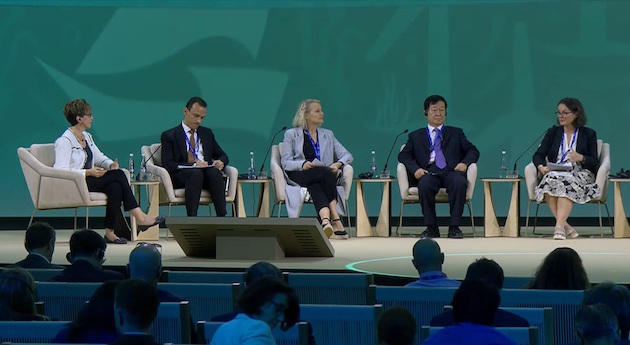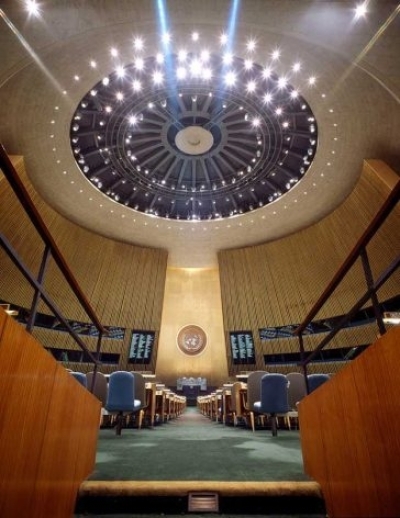DUBAI, Dec 06 (IPS) — In the spirit of global cooperation and environmental commitment, COP 28 launched a groundbreaking initiative aimed at transforming the building and construction sectors. Titled ‘Buildings and Construction for Sustainable Cities: New Key Partnerships for Decarbonization, Adaptation, and Resilience,’ the initiative marks a turning point in addressing the environmental challenges posed by the construction industry.
Three major frameworks were announced at the launch: Buildings Breakthrough, Cement Breakthrough, and the Forest and Climate Leader’s Partnership’s Greening Construction with Sustainable Wood initiative. These frameworks seek to catalyze collaboration between governments and stakeholders, providing a comprehensive solution for mitigating climate change, adapting to its impacts, and building resilience in the sector.
The sector accounts for nearly 40% of global energy-related CO2 emissions and 50% of extracted materials, which highlights the urgency of the initiative. Additionally, the sector generated one-third of global waste, highlighting the critical need for coordinated efforts to guide its transformation.
The global leaders and representatives, during the event, highlighted the urgency of the building and construction sector’s transformation. Their shared commitment to sustainability, resilience, and decarbonization set the stage for a new era of international collaboration, offering hope for a future where cities are built with a conscious effort to mitigate climate change and adapt to its inevitable challenges. The success of this initiative hinges on the continued dedication of nations, organizations, and communities to work together toward a sustainable and resilient future for all.

Maimunah binti Mohd Sharif, the Executive Director of the United Nations Human Settlements Programme, emphasized the sector’s role in greenhouse gas emissions and stressed the importance of accelerating the transition to more sustainable practices.
“The way we build our cities now will determine future emissions. Housing and buildings are also at the core of resilience. We need to accelerate the transition to regenerate the material. We need to ensure that the sector is decarbonized along with a lifecycle and increasingly resilient to natural disasters,” she said.
Stafen Wanzel, Deputy Director General of International Climate Action at the Ministry of Economic Affairs and Climate Action for Germany, echoed the sentiments, focusing on the pivotal role of cement and steel in achieving net-zero and resilient buildings. “Germany pledged 20 million euros for an international climate initiative to fund advancements in building materials, showcasing their commitment to holistic approaches that consider the energy, environment, and climate nexus,” she said.
Ditte Juul-Jorgensen, Director General of the ENER European Commission, reinforced the need for action to meet the goals of the Paris Agreement. She highlighted the potential to design and construct buildings more efficiently, using greener materials, and improving energy efficiency. This, she argued, aligned with the global commitment to triple renewables and double energy efficiency, essential for staying on track with the Paris Agreement’s targets.
“Today’s initiative is a necessary contribution to our work to mitigate climate change and to mitigate emissions, and it is completely aligned with the global pledge for tripling renewables and doubling energy efficiency. To respect our 1.5 degrees as agreed in Paris, this initiative is really part of it,” she said.
Abdel Khalek Ibrahim, the Assistant Minister for Technical Affairs at the Ministry of Housing Utilities in Egypt, emphasized the initiative’s global scope. With over 500,000 informal areas, Egypt faces the challenge of balancing housing demand with green climate resilience. He said that the Egyptian government established a national council for green housing and urbanism to formulate a roadmap for gradually transforming housing to be more resilient and energy efficient. “We need to think about how to strike a balance between housing demand and green climate resilience, as Egypt has more than 500,000 informal areas.”
Ali Zaidi, assistant to the President and National Climate Advisor of the USA, highlighted the transformative potential of the initiative for people’s lives. Focusing on building codes and transitioning from fossil-based to electricity-based heating, the U.S. emphasized a worker- and community-centered approach. Zaidi stressed the importance of grants, design standards, and enforcement to facilitate the sector’s transformation.
“Buildings are the places where we worship, where we live, play, and breathe. There will be a visible difference in the lives of so many people in the coming time. This is the opportunity we must deliver for our citizens. This transformation we are making here must be worker-centered and community-centered,” Zaidi said.
Jo da Silva, Global Sustainability Director for ARUP, discussed the challenges faced by her organization in driving change amid diverse jurisdictional rules. While acknowledging the success keys in Europe, Asia, and the U.S., she emphasized the unique opportunities in Africa, where 80% of the buildings needed in the next two decades are yet to be built. Da Silva urged governments to create a level playing field, facilitating collaboration rather than competition, to unlock the full potential of innovation and industrialized construction in the sector.
IPS UN Bureau Report






